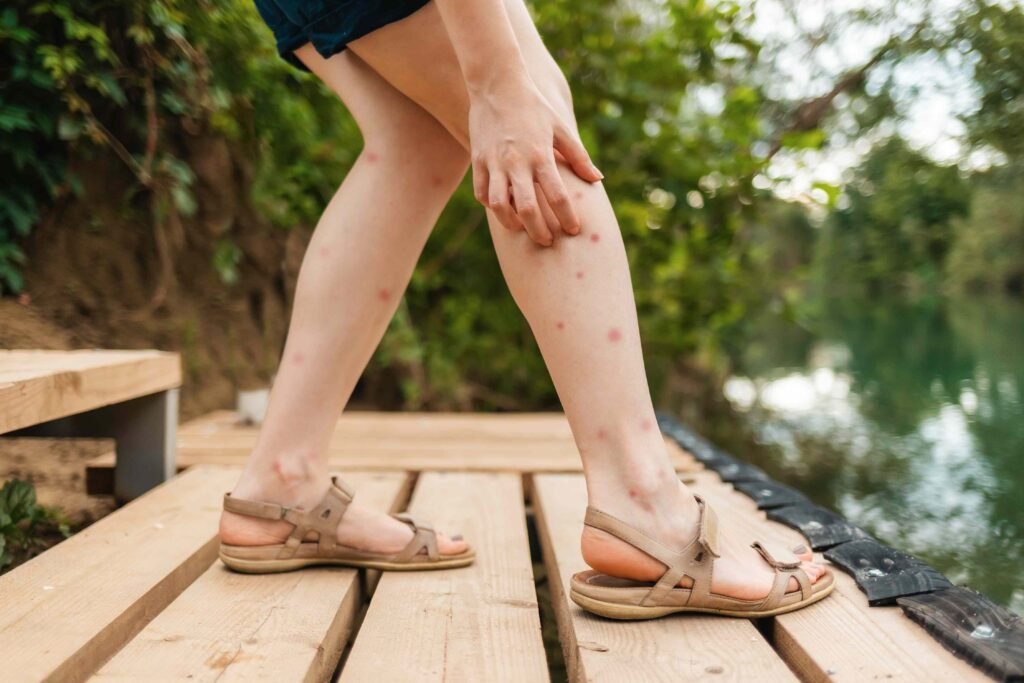Itchy bumps on the skin that aren’t mosquito bites could be a symptom of several health conditions and reactions, including hives, other bug bites, and some skin conditions.
Learning the signs and symptoms of common causes can help you identify what’s causing your itchy bumps and determine the best treatment.
Hives, also known as urticaria, are red, raised bumps on the skin caused by an immune reaction in the body. They often appear as red or pink, raised, and inflamed patches of skin. They usually feel very itchy.
Common causes of hives include:
- Allergic reactions
- Viral infections (especially common in children)
- Medication reactions
- Insect bites or stings
- Chronic stress
What to do: Hives usually resolve on their own within a few days. To ease the itching and swelling, try applying a cool compress to the rash. Use an over-the-counter (OTC) anti-itch cream as well.
Fleas are tiny parasites that bite humans and animals to suck their blood. Flea bites often appear as small, red bumps that feel itchy. To check yourself for fleas, look for tiny brown bugs that are the size of a pinhead. They tend to appear in groups.
Chiggers are microscopic mites that can be found in wooded areas and grassy fields. Chigger bites can cause small, pimple-like bumps that are very itchy.
What to do: Flea and chigger bites may be itchy and uncomfortable. To ease the symptoms, wash the area with water and mild soap. Apply an OTC anti-itch cream or calamine lotion if needed. If possible, refrain from scratching the bites, which can cause more inflammation and itching.
Bed bugs are small, flat insects that feed on humans and animals during the night. They can be found in bedding, mattresses, and couches. They do not spread disease, but their bites can cause itchy welts. The bites usually appear as a cluster of red bumps that may form a line on the body.
What to do: To treat bed bug bites, wash your skin with water and mild soap. Use an anti-itch cream as needed. If you suspect that you have bed bugs in your home, consult a professional pest control company.
Eczema is a group of chronic, inflammatory skin conditions. Common symptoms include itchy, red, irritated skin. Healthcare providers believe eczema occurs due to a combination of environmental and genetic factors.
Dyshidrotic eczema is a type of eczema that causes itchy, fluid-filled blisters, primarily on the hands and feet. The blisters usually develop as a reaction to heat, stress, sweat, or certain chemicals.
What to do: Eczema treatment options may vary based on the symptoms and type of eczema. Treatment options may include:
- Daily moisturizer and skincare routine
- Skin creams
- Light therapy
- Oral medications
- Avoiding triggers
- Stress management
Contact dermatitis is another type of eczema. It can occur when your skin comes into contact with an irritant or allergen. It causes an itchy, red rash with fluid-filled blisters. Common irritants include chemicals, metals, fragrances, and certain plants.
What to do: Most rashes resolve on their own. To soothe symptoms at home, apply a cool compress, anti-itch cream, or calamine lotion. The only way to prevent contact dermatitis is to avoid the irritating substance.
If you’re unsure what substance is causing your reaction, consider seeing an allergist for testing.
Guttate psoriasis is a type of psoriasis, an autoimmune skin condition. This type primarily affects children, causing small, scaly, teardrop-shaped, itchy red bumps on the skin. Guttate psoriasis commonly develops after an infection, usually strep throat.
What to do: A dermatologist (skin specialist) can help diagnose and develop a treatment plan for guttate psoriasis. Treatment options may include:
- Cortisone cream
- Anti-itch lotions
- Dandruff shampoo
- Moisturizers or lotions that contain coal tar
- Topical vitamin D
- Biologics
- Phototherapy
Scabies is a skin condition caused by mites when they burrow into your skin. Scabies causes small, pimple-like skin bumps, which can be intensely itchy and uncomfortable. The condition spreads quickly through skin-to-skin contact, clothing, and bedding, and may be more common in crowded conditions.
What to do: There are several lotions available to treat scabies. To eliminate the mites themselves, it’s necessary to wash your clothing, bedding, and towels in hot water and dry them completely, also on the hot setting. Your close contacts and any sexual partners likely need treatment as well.
Keratosis pilaris is a chronic skin condition that often affects adolescents. An excess of keratin, a protein found in hair, causes tiny red bumps that look like goosebumps. The bumps most commonly develop on the limbs and buttocks. They may sometimes feel itchy.
What to do: This condition is benign (not dangerous) and often clears up on its own. Treatment options may include:
- Moisturizing lotions
- Medicated vitamin A creams
- Exfoliation
- Laser treatments
Many common causes of itchy skin bumps, including insect bites and mild allergies, do not always require medical treatment. You can see a doctor if you don’t know what’s causing the itchy bumps. Your doctor may perform a physical exam and medical tests to determine the underlying cause and appropriate treatment plan.
It’s also important to see a doctor if you develop itchy bumps on your skin with any of the following symptoms:
- Trouble breathing
- Difficulty swallowing
- Fever
- Uncontrollable itching
Common causes of itchy bumps that aren’t mosquito bites include flea or other insect bites, hives, and eczema. Other causes may include psoriasis, scabies, or keratosis pilaris. See a doctor if your bumps do not improve with home care or if the itching is uncontrollable.

